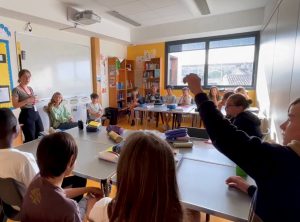It’s nearly the end of the summer holidays 2014 and time to charge up our sun-drenched souls with the motivation to get our children ready to go back to school. If there is anyone who can rev up inspiration it is none other than Marc Wolstencroft, former head of Wix Primary in Clapham and social engineer of a pioneering Franco-British bilingual program. I met him in London in June when he had come back from Montpellier for Wix Primary School‘s 20th anniversary celebrations. He had a wry smile about him that said, I wouldn’t miss it for the world.
How did you get into bilingual education?
As the face of Franco-British bilingual education in London, Marc Wolstencroft cut to the chase straight away: « My wife is French, » he began. « We wanted to raise our daughter, Jeanne bilingually. »
When Jeanne, now 25, enrolled in the Lycée Français Charles de Gaulle in South Kensington, Marc Wolstencroft was already well along his professional pathway in education. Having held teaching as well as advisory roles as headmaster and inspector for some time, initially, it seemed his for the taking when the headmastership at Wix Primary School came up.
Except that Wix in 2004 was suffering from a poor reputation. Housed next to Ecole de Wix, a primary adjunct to the Lycée Français Charles de Gaulle, Wolstencroft recalled: « Wix Primary in 2004 was about to be closed. It was what some would call a sink school and not a desirable place to send children at all. With disaffected families as the face of Wix, something like 60% were on free school meals. »
Only for Wolstencroft, Wix’s poor image was not a deterrent but an opportunity. He began to talk to André Bécherand, then proviseur at the Lycée Français Charles de Gaulle, and a vision was born: Join Wix Primary and Ecole de Wix to form a bilingual stream.
« For a school to succeed you need a mix, » Wolstencroft’s face lit up. « A mix makes for a more aspirational school and changes the dynamics of the school. It raises achievement. »
The idea of drawing Anglophone students from Wix Primary and Francophone ones from Ecole de Wix to create a bilingual stream was an intriguing if ambitious plan. There has been the unshakable fear that bilingual students end up weak in both languages at best, or worse, unable to separate the two. For the unenlightened, mix meant muddled.
Not for Wolstencroft, who rallied for a two-way immersion that followed two curricula to national standard: 2½ days in French and 2½ in English in any given week. The switch was to take place on Wednesday at lunch.
Were people sceptical that this could work?
Of course. « The old school is incapable of understanding how a bilingual program can be successful. They can barely fathom how some of the students who were outperforming the national standard were a year younger than their peers (the French age cut off is in December) let alone taking lessons in both French and English. »
I take out a printout of some exam results he had sent me in an earlier e-mail exchange: Year 3 (French CE1), Year 6 SAT, and Year 6 French national evaluations. In all the three comparisons, the Wix students outperformed national standards by a long shot. For example, for the French National Reading Test 2013, Wix Bilingual had 66.7% in the Tres Solides category compared to 43% nationally; Wix Bilingual had 92.6% for the French National Maths compared to 38% nationally.
« But, » contemplates Wolsencroft, « league tables are not about education. » While acknowledging that heads are under tremendous pressure to follow targets, he continues: « They denude the richness of the colour of the school. »
I went to Wix Primary to interview the current deputy head, Rebecca Osuntokun, then again to observe a bilingual awareness initiative called Native Scientist that brings bilingual scientists together with bilingual primary school children. In both encounters, Wolstencroft’s bilingual program was alive and thriving. What’s more, the energy was contagious and lasting enough to take with us to step into the autumn term.
« Schools should be about education and about challenging students, » said Wolstencroft on parting. « If the social engineering works the results will follow. »
Haru Yamada
Bilingual Series 2
1 September 2014






